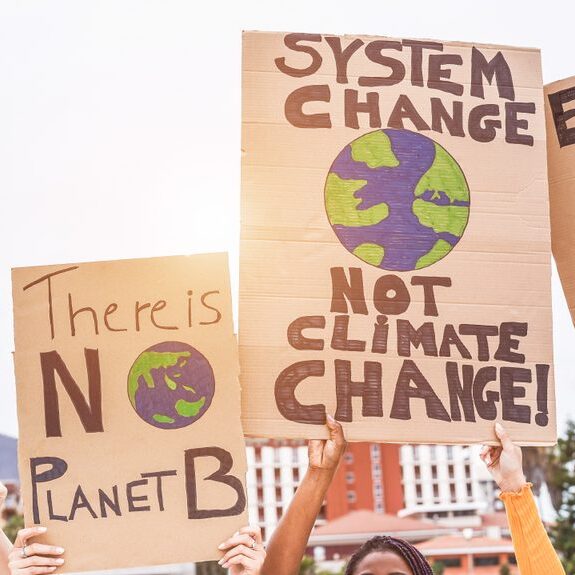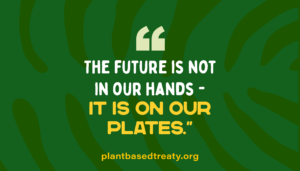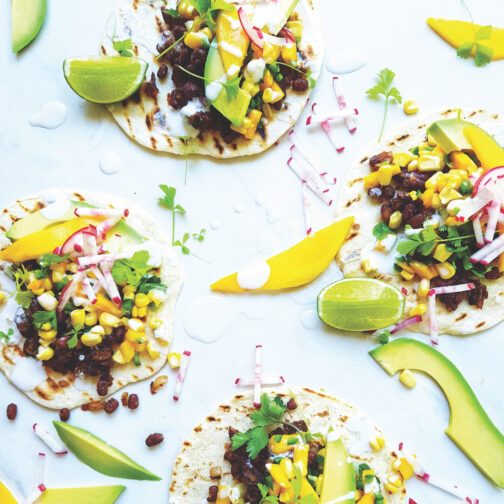
Animal agribusiness is one of the biggest threats to the planet’s ecosystems and climate stability. Plant-based advocates are calling on world leaders to change the system.
Our global food system is responsible for over 30 percent of greenhouse gas emissions, with around 60 percent of emissions generated by animal agriculture. As world leaders gather in Egypt for the UN’s international climate conference, nonprofit and plant-based industry advocates are urging them to set tangible targets to transition to animal-free alternatives.
A transformative solution
The International Plant Based Foods Working Group is a coalition of plant-based food trade associations on a mission to bring about a healthier, more sustainable, and more humane food system. The group sees this year’s climate conference as a historic opportunity for global leaders to define a bold, concrete action plan to tackle the food system roots of our current climate crisis.
“As world leaders gather to discuss climate solutions at COP27, it is essential that there are clear targets identified to aid in global transitions towards plant-based food systems,” says working group representative Rachel Dreskin, CEO of the Plant Based Foods Association.
“We have reached a moment in history when our actions will determine the viability of our planet and the life it sustains – and, to ensure a healthier, more sustainable, and more equitable future for generations to come, we need a resilient food system that works for people, the planet, and animals alike.”
“We need a resilient food system that works for people, the planet, and animals alike.”
Ban factory farming
Meanwhile, advocates from World Animal Protection are drawing attention to the outsized climate and ecological impacts of factory farming, primarily driven by deforestation to make way for feed crops. Their recently released Climate Change and Cruelty report revealed that four trees are felled to make way for animal feed crops to produce just 10kg of chicken, and five trees cut down for every 10kg of pork.
“As well as inflicting immense cruelty on animals, factory farming is starving the planet of a sustainable future,” said World Animal Protection CEO, Steve McIvor. “As our report shows, we are witnessing an alarming decline of global biodiversity, spiralling carbon emissions, and public health crises from the pollution of waterways or contamination of the food chain because of factory farms. So it’s vital for governments to commit at COP27 to recognise and rein in this hitherto silent global warming culprit – because failure to do so will mean the Paris Climate Agreement emission targets to limit the planet to a 1.5 degrees Celsius temperature rise will never be met.”
Putting food systems on the negotiating table
For the first time in the conference’s 28-year history, advocates are hosting pavilions focused on food systems within the UN-managed ‘Blue Zone’ where the negotiations are held. These include the Food4Climate Pavilion, and the Food Systems Pavilion – both focusing on actions, strategies, and solutions for an equitable, healthy, and nature-positive future through shifting to alternatives to animal products.
“Approval by the UN to set up the Food4Climate Pavilion at COP27 really marks a tectonic shift in the UN’s approach to food systems,” said Raphael Podselver, Head of UN Advocacy at coalition member ProVeg International. “We hope the pavilion will engage policymakers around the world to address the challenges posed by agriculture and encourage countries to embrace the solutions.”
The Good Food Institute is one of the hosts of the Food Systems Pavilion. Representative Seren Kell said, “The latest IPCC report has made clear that nothing short of a rapid transformation of the food system is essential if the world is to avoid catastrophic climate change.
“As global demand for meat continues to grow, the world’s top scientists have recognised plant-based and cultivated meat as part of the solution. Particularly in Europe and the global north, where meat consumption remains unsustainably high, governments must invest in these new ways of making meat, which require far less land and water, and cause a fraction of the emissions of conventional meat production.”
Plant Based Treaty now!
The Plant Based Treaty campaign is also building momentum for a food system transformation. Ahead of this year’s climate talks, it has been gathering global signatories to an open letter addressed to the COP27 hosts, calling for plant-based solutions to the climate crisis.
As the letter states, “The current food system is a major contributor to the accelerating greenhouse gas emissions, agricultural sprawl and deforestation, loss of biodiversity, air and water pollution, soil degradation and health crises. Animal agriculture is a leading driver of further crises including the transgression of planetary tipping points.”
Through proposed policy changes under the campaign’s three key pillars, it sets out a vision for a binding Plant Based Treaty whose policies would bring the world back within safe planetary boundaries through a sustainable and just plant-based food transition.
“COP27 must be the key moment when the problems of the current food and agriculture system are finally recognised and the actions taken are in line with today’s challenges,” it concludes.
***
The Food Systems Pavilion sessions will be livestreamed throughout the conference from 6–18 November, and the Food4Climate Pavilion program, which runs from 7–18 November, will also be livestreamed.
Lead image: DisobeyArt on Shutterstock



























